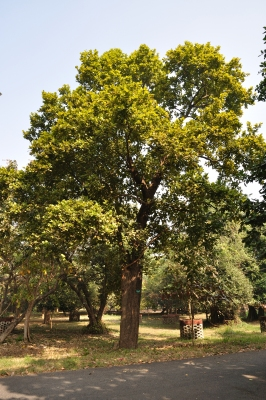Haryana Switch to Hindi
Mukhya Mantri Tirth Yatra Scheme
Why in News?
Haryana Chief Minister Nayab Singh Saini announced that the Haryana government is facilitating pilgrims to visit Ayodhya and other sacred sites through the Mukhya Mantri Tirth Yatra scheme.
Key Points
- Under the scheme, members of families with annual income less than ₹1.80 lakh who are more than 60 years of age are taken for pilgrimages to Ayodhya, Varanasi, and other holy sites.
- According to the CM, the state government has taken several steps to boost religious tourism in the State.
- Kurukshetra is becoming a center for religious tourism, attracting visitors from across the country and internationally.
- There are endeavors to explore the tourism opportunities in other locations as well.
Varanasi
- Varanasi is in southeastern Uttar Pradesh state. It is located on the left bank of the Ganges (Ganga) River and is one of the seven sacred cities of Hinduism.
- It is one of the oldest continuously inhabited cities in the world. Its early history is that of the first Aryan settlement in the middle Ganges valley.
- Varanasi was the capital of the kingdom of Kashi during the time of the Buddha (6th century BCE), who gave his first sermon nearby at Sarnath.
- The city remained a centre of religious, educational, and artistic activities as attested by the celebrated Chinese Buddhist pilgrim Xuanzang, who visited it in about 635 CE.
- Varanasi subsequently declined during three centuries of Muslim occupation, beginning in 1194.
- Varanasi became an independent kingdom in the 18th century, and under subsequent British rule it remained a commercial and religious centre.
- In 1910, the British made Varanasi a new Indian state, with Ramnagar (on the opposite bank) as headquarters but with no jurisdiction over the city of Varanasi.
- In 1947, after Indian independence, the Varanasi state became part of the state of Uttar Pradesh.


Haryana Switch to Hindi
SC Upholds HC Order to Grant Extra Marks to State Domiciles
Why in News?
Recently, The Supreme Court upheld the high court ruling to cancel the Haryana government's decision to award 5% extra marks to state residents for specific job recruitments based on "socio-economic" factors, deeming it an unjustified action.
Key Points
- The Haryana Staff Selection Commission's plea to challenge a Punjab and Haryana High Court decision overturning a state notification providing extra marks to Haryana residents during the Common Entrance Test of 2023 (CET 2023) has been denied by a bench. The court ordered for new exams to be carried out.
- Under this "socio-economic" criteria, the Haryana government provided extra importance to residents of Haryana on fulfillment of certain conditions.
- These conditions included having no family members as permanent government employees and a total annual family income from all sources below Rs 1.8 lakh.
Domicile Reservation
- On one hand the Art 16(2) of the Constitution says, “No citizen shall, on grounds only of religion, race, caste, sex, descent, place of birth, residence or any of them, be ineligible for, or discriminated against in respect of, any employment or office under the State.”
- On the other hand the clause 4 of the same article says that nothing in this article shall prevent the State from making any provision for the reservation of appointments or posts in favour of any backward class of citizens which, in the opinion of the State, is not adequately represented in the services under the State.
- But these provisions are applicable in government jobs.
- Art 19(1)(g) provides all citizens the right to practice any profession, or to carry on any occupation, trade or business.
- Thus imposing such limitations by State Governments infringe upon an individual's constitutional right to engage in their chosen profession, trade, or business, as stated in Article 19(1)(g).
- Furthermore, the High Court in its decision stated that “The concept of constitutional morality has been openly violated by introducing a secondary status to a set of citizens not belonging to the state of Haryana and curtailing their fundamental rights to earn their livelihood.”
- The Andhra Pradesh High Court observed that the Andhra Pradesh’s Bill for providing reservation on the basis of domicile, passed in 2019, “may be unconstitutional”, but it is yet to hear the case on merits.


Uttarakhand Switch to Hindi
Adi Kailash, Om Parvat Yatras Suspended for Monsoon
Why in News?
According to the officials, the Pilgrimages to Adi Kailash and Om Parvat in Uttarakhand's Pithoragarh district will be temporarily suspended from 25th June 2024.
Key Points
- The yatras were temporarily suspended due to the fear of monsoon disrupting pilgrimages to high-altitude sites. Yatra bookings will resume in September 2024.
Adi Kailash & Om Parvat
- Adi Kailash is known as Shiva Kailash, Chota Kailash, Baba Kailash or Jonglingkong Peak, is a mountain located in the Himalayan mountain range in the Pithoragarh district of Uttarakhand.
- Om Parvat is also a part of the Kailash Mansarovar Yatra, a pilgrimage that includes visiting Mount Kailash and Lake Mansarovar in Tibet.
- The revered mountains of Adi Kailash & OM Parvat are located on Indo-China border in the Pithoragarh District of Uttarakhand.
- Both peaks bear significant religious importance for devotees of Lord Shiva.


Uttarakhand Switch to Hindi
Khalanga Reserve Forest
Why in News?
Recently, Local residents of Dehradun united to save 2,000 Sal trees in Khalanga Reserve Forest. Due to public protest against tree felling, the state government will relocate the planned drinking water plant from the forest.
Key Points
- Environmental activists protested the marking of 2000 Sal trees in Khalanga Reserve Forest for the Song Dam drinking water project, causing deep annoyance among locals who started protesting against the project.
- A social media campaign was launched to spread awareness and some groups tied Raksha-Sutras to the trees for protection.
- A drinking water project worth Rs. 524 crores will be built under the Song Dam project in Dehradun, with an estimated total cost of 3000 crores.
- The project includes the construction of a reservoir near the Song Dam and a 150 MLD (Megaliters Per Day) water treatment plant on 4.2 hectares of land.
- The project aims to supply drinking water to 60 wards of the capital from Kanar village, ultimately helping Dehradun's 60 wards.
Sal Tree
- Shorea robusta, the sal tree, is a species of tree in the family Dipterocarpaceae.
- The tree is native to India, Bangladesh, Nepal, Tibet and across the Himalayan regions.
- Description
- It can grow up to 40 metres tall with a trunk diameter of 2 metres.
- The leaves are 10–25 cm long and 5–15 cm broad.
- In wetter areas, sal is evergreen; in drier areas, it is dry-season deciduous, shedding most of the leaves from February to April, leafing out again in April and May.
- The sal tree is known also as sakhua in northern India, including Madhya Pradesh, Odisha and Jharkhand.
- It is the state tree of two Indian states – Chhattisgarh and Jharkhand.
- Culture
- In Hindu tradition, the sal tree is sacred. It is also associated with Lord Vishnu.
- The tree's common name, sal, comes from the word shala, which means 'rampart' in Sanskrit.
- Jains state that the 24th tirthankara, Mahavir, achieved enlightenment under a sal tree.
- Some cultures in Bengal worship Sarna Burhi, a goddess associated with sacred groves of Sal trees.
- Buddhist tradition holds that Queen Māyā of Sakya gave birth to Gautama Buddha while grasping the branch of a sal tree or an Ashoka tree in a garden in Lumbini in south Nepal.
- Also according to Buddhist tradition, the Buddha was lying between a pair of sal trees when he died.


Rajasthan Switch to Hindi
Rajasthan High Court Notice to NTA
Why in News?
The Rajasthan High Court issued notices to the National Testing Agency (NTA) and the Centre regarding requests for the cancellation of the medical entrance exam NEET-UG due to alleged irregularities.
Key Points
- The National Eligibility and Entrance Test (NEET) Undergraduate exam paper leak has escalated, leading to protests demanding a re-test and a Central Bureau of Investigation (CBI) probe.
- The Rajasthan high court set the hearing for 10th July 2024, two days after the Supreme Court is scheduled to hear similar petitions, including those seeking cancellation of the NEET-UG 2024 exam and a court-monitored investigation.
National Testing Agency
- About:
- The National Testing Agency (NTA) was established as a Society registered under the Indian Societies Registration Act, 1860.
- It is an autonomous and self-sustained testing organisation to conduct entrance examinations for admission in higher educational institutions.
- Governance:
- NTA is chaired by an eminent educationist appointed by the Ministry of Human Resource Development.
- The Chief Executive Officer (CEO) will be the Director-General to be appointed by the Government.
- There will be a Board of Governors comprising members from user institutions.
NEET- UG
- National Eligibility-cum-Entrance Test (Undergraduate) or NEET, formerly the All India Pre-Medical Test, is an entrance examination for admission in undergraduate medical programs (MBBS and BDS courses) in India.
- It is conducted by the NTA.


Jharkhand Switch to Hindi
Burudih Dam as Tourist Destination
Why in News?
Jharkhand CM Champai Soren directed officials to develop Burudih dam into a national-level tourism destination during his visit to the scenic dam in Ghatsila sub-division of East Singhbhum.
Key Points
- The CM emphasized Jharkhand's natural beauty while planting saplings and tying rakhi around a tree to emphasize environmental conservation.
- He affirmed the government's commitment to promoting various tourist spots across the state, including religious sites, forests, dams, and waterfalls.
- The government is working to ensure that local farmers benefit from the dam's water resources and is focusing on holistic development across all sectors for the state's rapid progress.
- The CM inaugurated 2,141 development projects worth over Rs 45 crore and distributed assets under welfare schemes worth over Rs 71 crore among 20,484 beneficiaries.
- He highlighted recent government initiatives including providing 200 units of free electricity, waiving farm loans up to Rs 2 lakh, and offering financial assistance to youth for livelihood support.
- He reaffirmed his government's dedication to constructing 2 million houses under the Abua Awas Yojana for underprivileged families, ensuring that welfare schemes reach every section of society through the 'Aapki Yojana, Aapki Sarkar, Aapke Dwar' program.
Abua Awas Yojana (AAY)
- Under this scheme, the state government will provide housing to the needy people from its own funds by spending more than Rs 15 thousand crore in the next two years.
- Under the scheme, 3 room houses will be provided to the poor, deprived, labourers, farmers, tribals, backward and Dalits.
Aapki Yojana, Aapki Sarkar, Aapke Dwar Program
- Under this program, camps will be organized in 4,351 panchayats and 50 wards of the state.
- In these camps, the needy people who were till now deprived of the schemes will be covered with public welfare schemes.










%20MPPCS%202025%20Desktop%20E.jpg)
%20MPPCS%202025%20Mobile%20E%20(1).jpg)










.png)
.png)











 PCS Parikshan
PCS Parikshan



